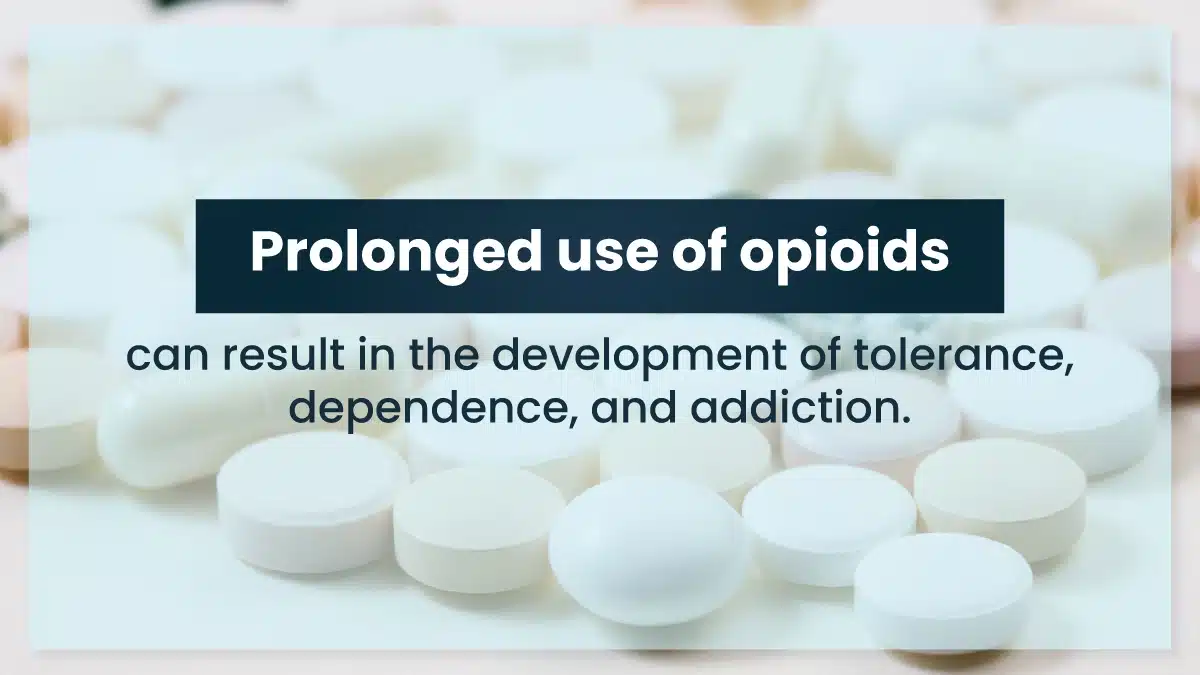Relief to Crisis: Effects of Opioids
Opioids, whether prescribed for medical purposes or obtained illegally, these substances profoundly affect the human body and mind.
On the one hand, they can provide a much-needed respite from pain, offering comfort and improved quality of life to patients dealing with chronic conditions or recovering from surgery.
This duality makes it imperative to explore and understand the multifaceted effects of opioids, both beneficial and harmful, to address the complex challenges they pose to individuals and communities alike.

Key Takeaways
The opioid epidemic in the United States highlights the urgent need for comprehensive prevention, treatment, and harm reduction strategies. Here’s what you need to know:
- Opioids are powerful pain-relieving medications that can lead to respiratory depression and mood disturbances when misused.
- Prolonged use of opioids can result in the development of tolerance, dependence, and addiction.
- Medical professionals should guide safe and responsible opioid use to minimize the risk of dependence and adverse health outcomes.
Contact The Haven Detox-Little Rock at (501) 271-3342 for more information and primary care to overcome opioid addiction.
Brief History of Opioids
Opioids have a long and complex history dating back thousands of years. Derived from the opium poppy, they were initially used for medicinal and recreational purposes in ancient civilizations, including the Sumerians, Assyrians, and Egyptians.
In the 19th century, the isolation of morphine and, later, heroin revolutionized pain management. Opioids gained widespread use in medical settings, but their addictive potential soon became evident.
How Opioids Work
Opioids work by binding to specific receptors in the brain and spinal cord known as opioid receptors. These receptors play a crucial role in pain modulation and pleasure sensation. When opioids bind to these receptors, they block pain signals and induce feelings of euphoria and relaxation.
However, prolonged use or high doses can lead to tolerance, dependence, and addiction as the brain adapts to the drug’s presence.
Medical Uses for Opioids
Opioids are a class of strong pain-relieving drugs that act on the nervous system to relieve pain.
Some of the medical uses of opioids include:
Pain Management
Opioids play a crucial role in pain management, particularly for severe, acute, or chronic pain. They are often prescribed after surgeries, for cancer-related pain, and in cases of trauma or severe injury.
Opioids bind to specific receptors in the brain and spinal cord, reducing pain perception. They are a valuable tool for patients who require strong analgesics to improve their quality of life.
Use in Surgeries
Opioids are commonly administered in surgical settings to provide pain relief during and after procedures. This ensures patients remain comfortable and pain-free, which is essential for successful surgery and post-operative recovery.
Surgical interventions such as major abdominal surgeries, joint replacements, and cardiac procedures frequently involve opioid use to manage the severe pain associated with these operations.
Negative Effects of Opioids
Opioids are prescription drugs like oxycodone, hydrocodone, and morphine, as well as illegal substances like heroin, which have garnered attention for their numerous adverse effects.
Let’s discuss three major adverse side effects of opioids:
Addiction
Opioid addiction is a pervasive issue, as these drugs can induce powerful physical and psychological dependence. Long-term use alters brain chemistry, leading individuals to crave opioids relentlessly. The pursuit of this high can disrupt personal and professional lives, creating a cycle of dysfunction.
Breaking free from addiction often requires intensive treatment from healthcare providers and support.
Overdose
Opioid overdoses are an alarming consequence of their use. The powerful pain relief opioids provide also comes with a high risk of respiratory depression, which can be fatal when taken in excessive quantities.
The rise of synthetic opioids, such as fentanyl, has intensified this risk, contributing to a surge in overdose deaths.
Withdrawal
Ceasing opioid use after prolonged consumption can trigger painful withdrawal symptoms. These symptoms, which include anxiety, pale skin, allergic reactions, sleep apnea, high heart rate, vomiting, and muscle pain, can be excruciating, making it challenging for users to quit.
Withdrawal drives some individuals to resume opioid use to alleviate the discomfort, perpetuating the cycle of addiction.
Opioids and Mental Health
Opioid drugs can have significant negative effects on mental health.
Here are some key points to consider regarding opioids and mental health:
Anxiety
The intersection of opioids and mental health is a complex and concerning issue. Anxiety is one of the many mental health conditions affected by opioid use. Opioids, such as prescription painkillers and heroin, can lead to feelings of anxiety and panic, both during use and withdrawal.
Chronic or higher doses of opioid use can alter brain chemistry, increasing sensitivity to stress and anxiety and making it difficult for individuals to manage their symptoms. This can create a vicious cycle where people turn to opioids to alleviate anxiety, but in the long run, it exacerbates their mental health struggles.
Depression
Misuse of opioids and depression often go hand in hand. While opioid medications may provide temporary relief from emotional pain, their addictive nature and withdrawal symptoms can plunge individuals deeper into depression.
The long-term use of opioids can also lead to structural brain changes and chemical imbalances that contribute to persistent depressive symptoms. Treating depression in the presence of opioid use requires a holistic approach, addressing both substance misuse and underlying mental health problems.
Bipolar Disorder
Opioid medicines can pose unique challenges for individuals with bipolar disorder. They may disrupt the delicate balance of mood swings, potentially triggering manic or depressive episodes. Furthermore, bipolar individuals may misuse opioids as a means of self-medicating during mood shifts.
This dual struggle necessitates a comprehensive treatment strategy that addresses both bipolar disorder and opioid use disorder simultaneously.
Treating And Managing Opioid Addiction
Opioid addiction is a complex and chronic condition that requires a comprehensive approach. The treatment for opioid dependence typically involves a combination of medical, behavioral, and psychosocial interventions.
Here are some of the most common effective treatment options :
Detoxification
Detox is the first step in treating opioid addiction. It involves the process of safely managing withdrawal symptoms as the body clears the opioids from the system. Detox can be done in an inpatient or outpatient setting and is often accompanied by medical supervision to ensure the safety and comfort of the individual.
Medication-Assisted Treatment (MAT)
MAT combines medications with counseling and behavioral therapies to provide a holistic approach to opioid addiction. The medications used include methadone, buprenorphine, and naltrexone. These medications help reduce cravings and withdrawal symptoms, making it easier for individuals to abstain from opioids.
Counseling and Behavioral Therapies
Various types of counseling and behavioral therapies are often employed in opioid addiction treatment. These can include Cognitive-Behavioral Therapy (CBT), contingency management, and motivational enhancement therapy.
Counseling helps individuals address the psychological and emotional aspects of a substance use disorder, learn coping skills, and develop strategies to avoid relapse.
Support Groups
Support groups like Narcotics Anonymous (NA) and SMART Recovery offer individuals the opportunity to connect with others who are going through similar experiences. These groups provide a supportive and non-judgmental environment where people can share their struggles and successes.
Inpatient or Residential Treatment
Some individuals with severe opioid addiction may benefit from inpatient or residential treatment programs. These programs provide a structured and supportive environment where individuals receive intensive treatment and therapy.
Education and Prevention
Prevention and education programs can help individuals, especially young people, understand the risks of opioid use and addiction. These programs aim to reduce the initiation of opioid use.
Harm Reduction Strategies
Harm reduction strategies, like naloxone distribution, are essential in addressing the health risks associated with opioid addiction.
Frequently Asked Questions (FAQ)
What are the long-lasting effects of opioid abuse?
Misuse of short-acting opioids can lead to long-lasting effects on the body, such as sleep-disordered breathing affecting mu-opioid receptors. High doses of prescription opioids may require Naloxone intervention and opioid therapy by medical doctors to treat physical dependence, increased tolerance, withdrawal symptoms, overdose risk, and health issues.
What are the central effects of opioids?
Opioids, pain medicines, primarily affect the central nervous system by binding to opioid receptors in the brain and spinal cord. This results in pain relief, sedation, euphoria, and a decreased perception of discomfort. Prescription opioids can also cause drowsiness, respiratory depression, and potential addiction due to their central effects.
What are the two effects of opiates?
Opiates, such as heroin, can induce intense euphoria and pain relief by binding to opioid receptors in the brain. These drugs also cause respiratory depression, which can lead to life-threatening consequences, as breathing becomes slow and shallow, potentially resulting in overdose and death.
Choose Healing, Choose The Haven Detox-Little Rock
Are you or a loved one struggling to overcome opioid addiction? Join The Haven Detox-Little Rock, where transformation begins.
Our detox and comprehensive residential treatment programs are designed to guide you toward recovery, providing a safe and supportive environment where you can begin your journey to sobriety.
In addition, our skilled therapists offer personalized counseling and unwavering support, helping you build essential coping mechanisms to address the root causes of drug abuse. Don’t let opioid addiction write your future. Contact us at (501) 271-3342 to unlock the doors to a healthier and addiction-free tomorrow.




